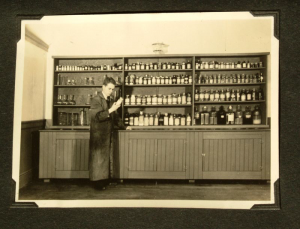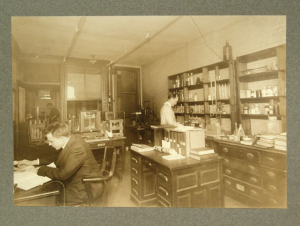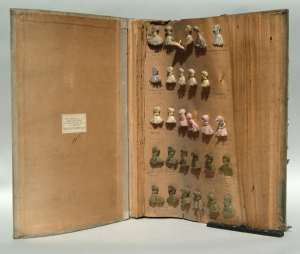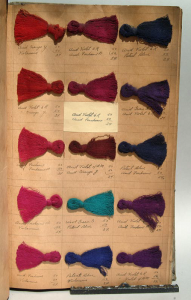 The Claire T. Carney Library Archives and Special Collections at UMass Dartmouth would like to announce a recently opened collection, MC 166, the Winthrop C. Durfee Personal and Business Papers, 1890-1930. This collection documents the history of Winthrop C. Durfee and his self-named business, The Durfee Dye Business, which was located in Jamaica Plain, Massachusetts. The collection was purchased in 2008 with private funds provided by the Osborne Fund, a Textile Science Foundation account.
The Claire T. Carney Library Archives and Special Collections at UMass Dartmouth would like to announce a recently opened collection, MC 166, the Winthrop C. Durfee Personal and Business Papers, 1890-1930. This collection documents the history of Winthrop C. Durfee and his self-named business, The Durfee Dye Business, which was located in Jamaica Plain, Massachusetts. The collection was purchased in 2008 with private funds provided by the Osborne Fund, a Textile Science Foundation account.
Winthrop C. Durfee was born on April 23, 1858 in Fall River, MA. Durfee attended Fall River Public Schools and later completed his education at Brown University in Providence, Rhode Island. Durfee graduated from college in 1878 and returned to Fall River where he became employed at a local cotton mill. In 1881, Durfee married Sylvie Whitney of Pawtucket, Rhode Island. They had three children together; Walter Chaloner Durfee, Philip Sherwood Durfee, and Pauline Elizabeth Durfee. Durfee was also able to trace his ancestry back to the first settlement of Plymouth Colony in Massachusetts Bay. Winthrop C. Durfee died on September 19, 1929 at 71 years old in his home located on 1 Dane Street, Jamaica Plain.
 The collection pertains to Durfee’s career as an independent chemist and consultant who advised his clients in the mills and local textile industry about the purchase of dyewoods, dyes, waxes, and dextrin which he would procure for his contacts. The collection contains letters, reports, extensive correspondence, invoices from suppliers, invoices to clients, orders from clients, tests and samples of dyed materials, Durfee’s personal chemistry notes and calculations as well as product catalogs and miscellaneous artifacts. The Durfee Dye Business, was one of the last members of the Guild of Drysalters which had been founded in the Middle Ages. Durfee and his employees performed a number of dyeing’s under controlled circumstances in order to learn and demonstrate the effects of his chromate mordant with wool dyeing. Durfee promoted his chromate mordant throughout WWI and its consistent use and color results was demonstrated on military uniforms.
The collection pertains to Durfee’s career as an independent chemist and consultant who advised his clients in the mills and local textile industry about the purchase of dyewoods, dyes, waxes, and dextrin which he would procure for his contacts. The collection contains letters, reports, extensive correspondence, invoices from suppliers, invoices to clients, orders from clients, tests and samples of dyed materials, Durfee’s personal chemistry notes and calculations as well as product catalogs and miscellaneous artifacts. The Durfee Dye Business, was one of the last members of the Guild of Drysalters which had been founded in the Middle Ages. Durfee and his employees performed a number of dyeing’s under controlled circumstances in order to learn and demonstrate the effects of his chromate mordant with wool dyeing. Durfee promoted his chromate mordant throughout WWI and its consistent use and color results was demonstrated on military uniforms.


Due to Durfee’s success in his field he was nicknamed the “Tartar King” by his associates. Durfee was very involved with professional organizations regarding the dye business. His professional associations included the Drysalters Club, an association of chemical and dye dealers in New England and of whom Durfee served as President in 1921. Others included the Engineers Club of Boston, The American Chemical Society, of which he was a councilor of the Northeastern section between 1919 and 1929, and he was a founding member and treasurer of the American Association of Textile Chemists and Colorists in 1921. Durfee’s offices were located at 516 Atlantic Avenue, Boston, MA.
–Rachel Breen, Graduate Student Intern, Simmons College School of Library and Information Science
The collection sheds light on business practice in the early 20th century, as well the history of allied fields in the textile industry. For more information or to access the collection please contact Judy Farrar at the Claire T. Carney Library Archives and Special Collections at jfarrar@umassd.edu. The finding aid is available online at http://www.lib.umassd.edu/sites/default/files/archives/findaids/MC166.pdf
Rachel is pursuing her master’s degree in Library and Information Science through the school’s new online MLIS program. She lives in Bourne, Massachusetts and works part time at the Elizabeth Taber Library in Marion, MA. She tackled the processing of this large and complex collection to fulfill a 130-hour field study for Archives Management.

